Shot by Shot
Posted on March 2, 2022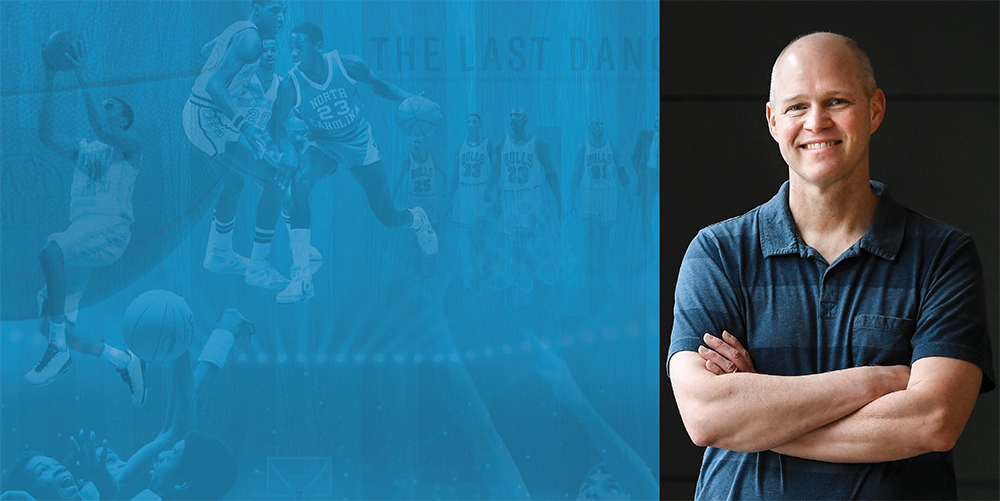
AP Images/Jessica Hill for Carolina Alumni Review
John Dahl ’86 has turned his youthful passion into
producing some of the most popular sports documentaries for ESPN.
by Tim Crothers ’86
They first met Oct. 16, 1982, on the court at Carmichael Auditorium. John Dahl ’86, then a freshman at UNC, was a freelance reporter for The Chapel Hill Newspaper working on his initial Tar Heel basketball assignment. Michael Jordan ’86, then a UNC sophomore geography major, had scored a basket seven months earlier to win a national championship. The two spoke for 15 minutes that afternoon with Jordan admitting to Dahl that he was “nervous” before his title-winning shot and curious about how the new 30-second shot clock and 3-point arc would affect the upcoming season. Dahl wrote a story headlined “Magical Michael Jordan.”
As a production assistant for the Tar Heel Sports Network during the 1983–84 basketball season, Dahl would interview the star guard regularly during Jordan’s final year at UNC. Dahl also recalls crossing paths later with Jordan on the driving range at Finley Golf Course, on North Campus the day Jordan announced he was declaring for the NBA draft and at Woollen Gym as Jordan secretly rehabbed to return to the Chicago Bulls after a foot injury during his second pro season. The two would eventually graduate in the same UNC class of 1986.
These days as an executive producer at ESPN, Dahl has worked on many documentaries featuring Jordan, including Dahl’s most recent project, The Tournament: A History of ACC Men’s Basketball, a monumental 10-part series that began airing in February. Dahl never could have imagined while in college how significant a role Jordan would continue to play in his life.
“It’s really neat to think back to that time because there’s an innocence to it,” Dahl said. “I see Michael in a way that maybe others don’t because I knew him when we were both just students at Carolina, when we were both in our early years of who we would become.”
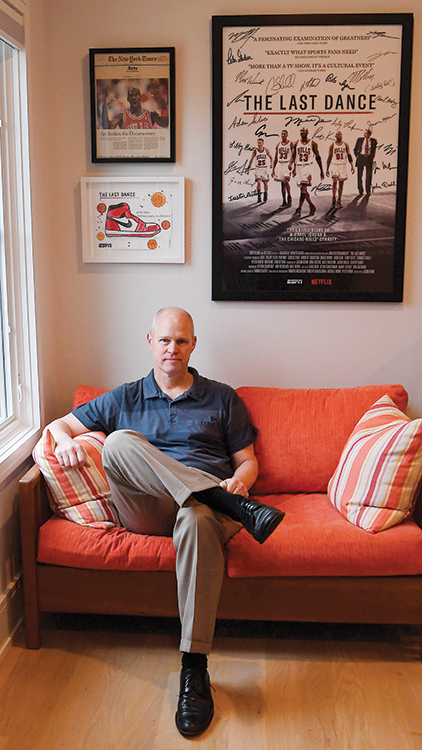
During a Zoom meeting in 2020 before the premier of The Last Dance documentary, Dahl told Michael Jordan ’86 their paths had crossed a lot at UNC. Dahl realized he’d been helping shape Jordan’s legacy for nearly 40 years since they’d first met in Carmichael Auditorium. Photo: AP Images/Jessica Hill for Carolina Alumni Review
Comfort and escape
On almost any day during his childhood in Rockville, Maryland, Dahl could be found in his driveway shooting hoops. Sort of. Like so many other kids, he would picture himself as his favorite player, Mo Howard, a shooting guard for his beloved Maryland Terrapins, sinking a buzzer-beater to defeat UNC or Duke at Cole Field House or in the ACC Tournament. Like so many other kids, Dahl was playing out a scenario that ends with a basketball falling through a hoop … except for one difference. There was no hoop. Dahl was actually shooting the ball against the side of his house. Dahl’s vivid imagination has always been able to fill in the missing details.
“Sports was who I was from my earliest memories,” Dahl said. “As a kid, I loved playing sports, watching sports, listening to games on the radio. I started writing my own little sports page. It went beyond something my parents could fully understand.”
On his seventh birthday, Dahl’s parents allowed him to stay up late to watch a game between Maryland and South Carolina. His heroes: Howard, John Lucas, Jim O’Brien, Tom McMillen and Len Elmore faced a mighty Gamecocks team ranked No. 2 in the country. Dahl fell asleep before the game ended, but when he woke up the next morning, following family custom, his father, Jack, had written down the final score on his Gold Bond Building Products stationery: Maryland 31, South Carolina 30. John had to fill in the details.
“That was back when they didn’t televise many games, so there was more mystery involved,” Dahl said. “You usually had to read about it the next day, and I learned how to read sitting on my dad’s lap with the sports section of The Washington Post. Whenever I could watch a game or listen on the radio, it gave me a level of comfort and escape that has stayed with me my whole life.”
In 1973, Dahl’s family moved to Coral Springs, Florida, deep in SEC country. He couldn’t watch the ACC on television anymore. His only option was to tune in to a 50,000-watt radio station at night and try to listen to Maryland basketball through the static. Dahl is still irked that he missed the 1974 ACC Tournament final between Maryland and N.C. State, one of the greatest games in college basketball history. He recalled watching the 11 o’clock news and learning that Maryland lost in overtime.
Dahl’s exile mercifully ended as a 12-year-old in 1976 when his family relocated to Charlotte. Relieved to be back in the ACC footprint, Dahl continued to root for Maryland but chose to attend Duke basketball camp in the summer of 1980, where he met the Blue Devils’ new coach, Mike Krzyzewski. Campers were assigned to learn how to spell the young coach’s name, and Dahl has had it memorized ever since. “I didn’t really like Krzyzewski’s camp because he wanted me to play defense, and I had no interest in playing defense,” said Dahl, laughing at the memory. “So, who was proven right in the long run, me or Mike Krzyzewski?”
During high school, Dahl satisfied his craving to watch sports late at night by setting up a small television on the desk in his bedroom and covertly draping his blanket over it. “That worked until the time my mother busted me during Game 5 of the 1980 NBA Finals,” Dahl said. “She told me to go to sleep, but what she didn’t realize was that I was doing research for my future career.”
“Sports was who I was from my earliest memories. As a kid, I loved playing sports, watching sports, listening to games on the radio. I started writing my own little sports page. It went beyond something my parents could fully understand.”
— John Dahl ’86
Finding his calling
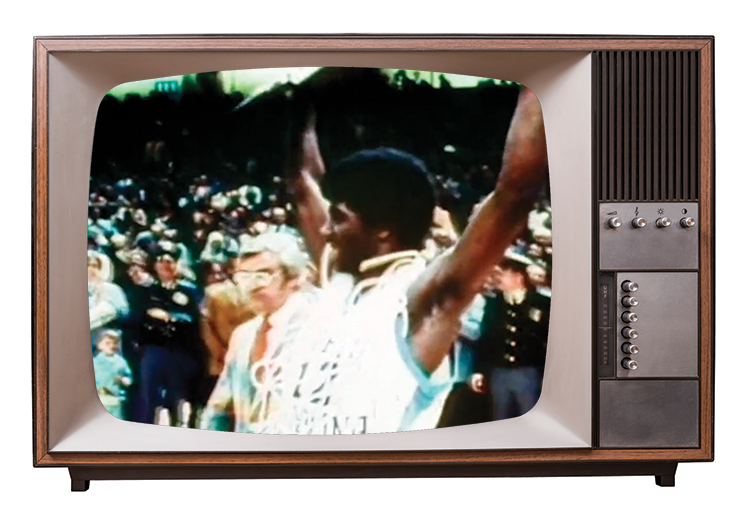
iStock/ESPN/Jason D. Smith ’94
Dahl was watching from that same Charlotte bedroom on the night Michael Jordan sank his NCAA championship-winning jumper, excited that he would be joining Jordan in Chapel Hill a few months later. Dahl’s curiosity about sports media led him to major in RTVMP (radio, television and motion pictures). He confesses that he was hardly a bookworm but credits his success in college to his capacity to take copious notes.
When he graduated, Dahl turned down a sportswriting job at The Charlotte Observer for an unpaid internship as a production assistant at CNN in Atlanta to explore his interest in television. Two years later, he accepted a position in ESPN’s Chicago bureau, where he again regularly interviewed Michael Jordan after Bulls games and practices. Following a second stint at CNN, where Dahl met a sports intern named Amy Lundy, who a year later would become his wife, Dahl returned to ESPN in 1997 and promptly heard about a project called SportsCentury. “It felt like it was created for me,” Dahl said. “I’ve always loved sports history, growing up watching NFL Films and the Bud Greenspan Olympic documentaries. That was a life-changer.”
Dahl would eventually produce eight of the 50 greatest athlete documentaries for SportsCentury, which aired on ESPN in 1999. He interviewed Arnold Palmer and Kareem Abdul-Jabbar and did the last one-on-one interview with Walter Payton before Payton announced he was gravely ill. Dahl also produced the final episode of the series that featured the century’s two greatest athletes, Babe Ruth and Michael Jordan. “From that point on, I’d found my calling,” Dahl said. “I knew that was what I really wanted to do with the rest of my career.”
Watch The Tournament
Check out the Review’s clips of Carolina basketball moments from all five weeks of John Dahl’s documentary series.
- See how Lennie Rosenbluth ’57, in the midst of a magical 1957 season, made a prophetic statement to Coach Frank McGuire.
- Watch Charlie Scott ’70 talk about how he felt welcomed by the team … but not always by the community.
- Watch Shammond Williams ’99 validate his coach’s faith in him.
- See the ACC’s most bitter rivalry come to a boil during the 1989 tournament final.
- …and more. It’s all here.
Along with ESPN executives Connor Schell and Bill Simmons, Dahl became part of the team who launched the network’s 30 for 30 series, producing many renowned episodes including Catholics vs. Convicts, The Two Escobars, I Hate Christian Laettner and, naturally, Jordan Rides the Bus about Michael Jordan’s professional baseball career.
“John is one of the most passionate sports fans I’ve ever met with the most incredible attention to detail that I’ve seen in this industry,” Schell said. “He has an encyclopedic knowledge of sports history and this extraordinary capacity to fine-tune every sound bite that needs more context, every transition where you can shave 15 seconds, every cut where the music is slightly off. As a master of the craft, he can be a total pain in the ass, in the best way.”
Schell points out that Dahl can still credit his success to taking copious notes. “John’s notes are legendary,” Schell said. “As a director you’ve poured yourself into a film, and then you get four pages of single-spaced feedback from John. Your first reaction is that he hates it. But then you start to dive in, and you understand that John cares so deeply, and it’s simply in the spirit of getting it right.”
Dahl watches each documentary dozens of times before finally signing off on it. “There’s a book that came out a while back called Don’t Sweat the Small Stuff, and I’m just the opposite,” Dahl said. “I sweat the small stuff, because to me it’s the small stuff that makes the difference in transforming these films from good to great.”
In 2007, Dahl first viewed the Michael Jordan footage that would become The Last Dance. When the film finally began production in 2018, as an executive producer Dahl became the clearinghouse for the notes process, distilling the opinions of multiple editors into constructive feedback for the director. The Last Dance was originally scheduled to air after the NBA Finals in June 2020, but when American sports ground to a halt that March because of COVID-19, Schell asked Dahl to determine whether the documentary could logistically fill the void. Dahl quickly devised a blueprint that called for two episodes each Sunday beginning on April 19. When the first two episodes aired, the last two in the series had yet to even be completed.
A Zoom meeting occurred on the night of the premiere, and Dahl addressed Jordan by saying: “Michael, we’ve crossed paths a lot, you probably don’t remember me, but we were students together at UNC, and I really think people are going to appreciate you in a new way after this film.” As Jordan thanked him, Dahl realized he’d been helping to shape magical Michael Jordan’s legacy for nearly 40 years since they’d first met in Carmichael Auditorium.
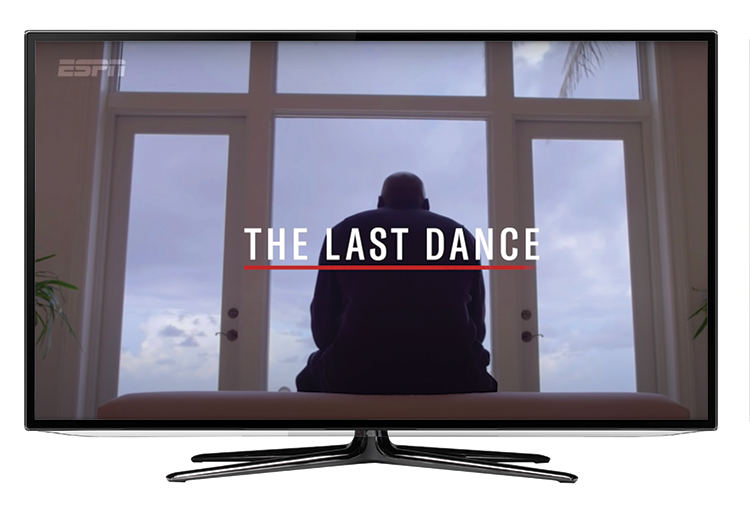
iStock/ESPN/Jason D. Smith ’94
The Last Dance would become by far the most watched documentary in ESPN history, averaging more than 15 million viewers per episode. “We knew there was a high anticipation for it, but before it aired I was wondering, ‘Will people want to be into this for a whole month?’ ” Dahl said. “Then when I first saw the ratings, I knew this would be the biggest thing I’d ever worked on. It was a phenomenon.”
‘A passion project’
As a production assistant at the Tar Heel Sports Network, Dahl witnessed his first ACC Tournament in 1984. Duke defeated UNC in the semifinals, one of the first signature wins for Dahl’s former camp counselor Mike Krzyzewski. The next day, much to Dahl’s delight, Len Bias led Maryland past the Blue Devils to capture the Terps’ second ACC Tournament title.
That sweet memory kept surfacing in Dahl’s mind while he worked on a series of documentaries chronicling SEC football. He was inspired to create something similar for the ACC. “I thought, ‘Let’s tell the story of ACC basketball through the history of the conference tournament because they had one when nobody else did,’ ” Dahl said. “Talk about a passion project. I wanted to do this because it is part of my identity.”
Dahl pitched his idea to the ACC Network in 2019 and then took it to director Jon Hock, whom he’d previously collaborated with on other ACC projects. “What I remember most from John’s pitch is being scared, because I knew that this is going to matter to him more than any other film we’ve done together,” Hock said. “Every time Maryland from the ’70s is on the screen, it’s a treat for him. When Mo Howard gave us these powerful, emotional interviews, John was so blown away because that was the sweet spot for him as a child discovering the magic of ACC basketball.”
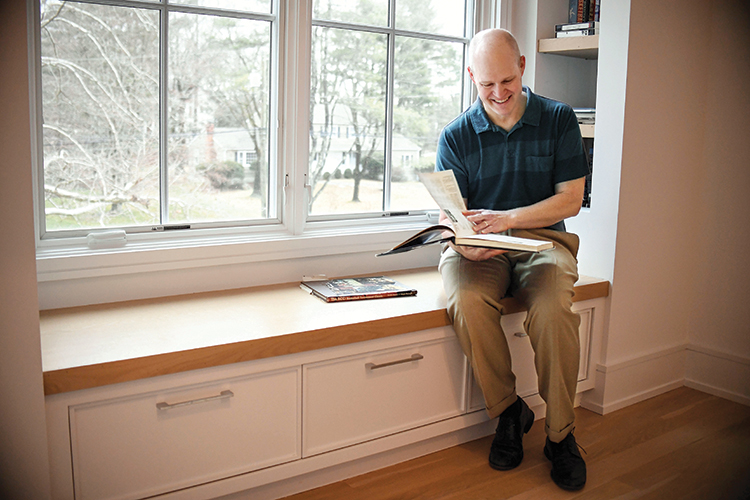
Dahl confesses he wasn’t a bookworm at UNC but credits his success to taking copious notes, a propensity he brought with him to ESPN. “John’s notes are legendary,” said an executive. Photo: AP Images/Jessica Hill for Carolina Alumni Review
The Tournament: A History of ACC Men’s Basketball begins with N.C. State coach Everett Case pioneering the creation of the ACC and its tournament and then traces the growth of the conference over the last seven decades through legendary coaches such as Dean Smith, Jim Valvano and Krzyzewski, as well as celebrated players such as David Thompson, Ralph Sampson and, of course, Michael Jordan. “I’ve brought something to the screen that has never been done before, and that is both exciting and humbling,” Dahl said. “I felt a responsibility to all of the amazing people who have played in the ACC, coached in the ACC, covered the ACC, as well as the fans who love ACC basketball, to get this right.”
The Tournament is the latest among hundreds of documentaries Dahl has produced during his nearly 25 years at ESPN. He calls it a “privilege” to have dedicated his career to a pursuit that began when he was a kid in his hoopless driveway, filling in the missing details.
“I’ll never forget when I got to a certain age and my parents asked me, ‘What are you going to do for a living?’ ” Dahl said. “I told them, ‘Sports. I’m going to tell stories about sports.’ They were like, ‘Really? You can make money doing that?’ I said, ‘Yeah, just trust me. It’ll work.’ ”
Thanks for reading the Carolina Alumni Review
Carolina Alumni members, sign in to continue reading.
Not yet a member? Become one today.
